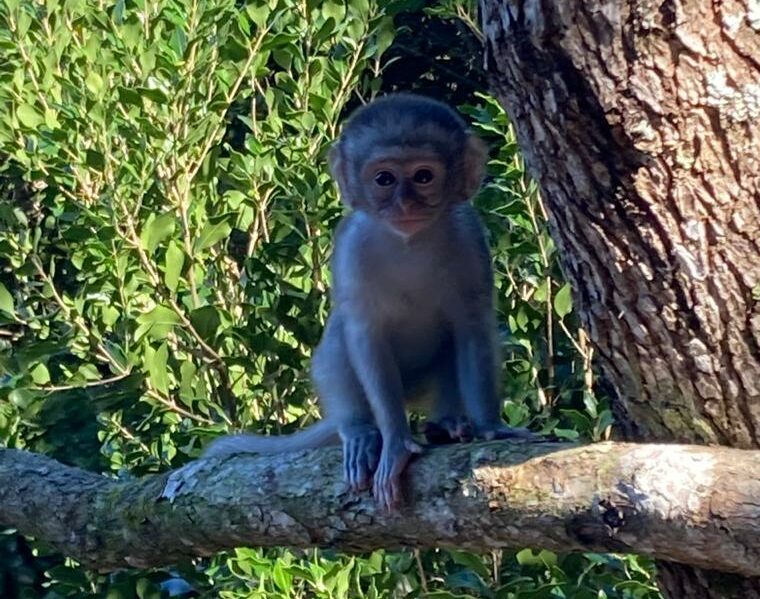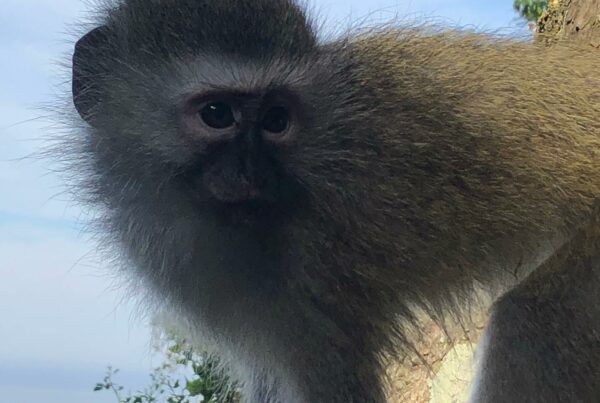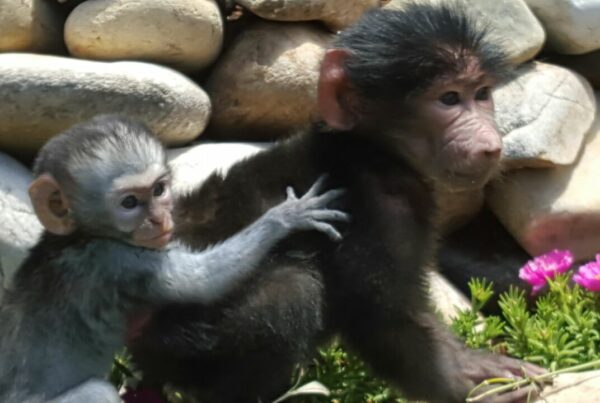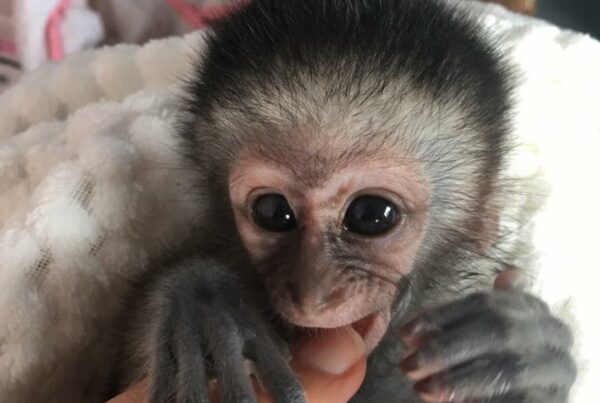Humans Feeding Wild Primates
A Need for Connection
By: Joeleen Beyers Monkey Matters
As a species, humans languish the need for connection, making them an enormous part of our daily lives. Whether it is in our workplace, school, neighbourhoods, communities or families, we all plan and live for these connections. This human connection has extended beyond human-to-human contact into domestic animals, nature and wildlife. Who does not feel at peace when standing over a cliff looking out into the awe-inspiring landscapes–or marveling at the amazing intelligence, impressive capability and majestic beauty of our wildlife? Particularly in South Africa, we are blessed to have the most diverse landscapes, scenery and wildlife on the planet. For some of us, it is right in our own backyards. However, due to population growth and urbanization being on a steady increase in the last century, our wildlife habitats are becoming more fragmented by the day. This has put us living closer to wildlife and thus competing for resources. Human/wildlife conflict happens everywhere on the planet; it is annoying at best, and deadly at worst. When humans live near a particular species of wildlife, they sometimes grow an affection towards it. Although this can be a wonderful connection, it can turn into an overextension of emotions or an anthropomorphism of behaviors. It can also lead to humans feeling a sense of responsibility to help animals survive in an environment in which we have harmed.
One way that humans believe that they can obtain a deeper connection with wildlife is through feeding. Some humans believe that because they ‘know’ these primates, that they are hungry and need our food to survive. Unfortunately, this need to intervene and desire to have this human connection will ultimately be at the detriment of the animal involved.
South African Primates
South Africa has 6 species of non-human primates (here within referred to only as primates). Chacma baboon (Papio ursinus), vervet monkey (Chlorocebus pygerythrus), samango monkey (Cercopithecus mitis), dwarf galago (Galagoides granti), lesser bushbaby (Galago moholi) and the thick tailed bushbaby (Otolemur crassicaudatus). Not all of them are dispersed widely throughout South Africa, but the chacma baboons and vervet monkeys are found in all 9 provinces. For this article, I will focus on two species: baboons and vervets. Both species can be mentioned as monkeys, as their taxonomy implies.
Why Feeding Primates is a Bad Idea
Health Risks
Monkeys do not need food from humans to survive. They are omnivorous, eating a huge variety of natural foods. Even after droughts or fires, they are still able to forage naturally by digging up roots, eating insects and rapid nitrogen-rich grasses that grow following fires. They can also travel longer distances to access natural foods. This traveling is not only good for physical and mental health, but necessary for seed dispersal.
Human food (artificial food) is not healthy for them. They are usually given food that is high in calories, carbohydrates, and sugars. These foods can lead to illnesses such as diabetes, as well as causing tooth decay. Their stomachs are very sensitive and susceptible to many different types of bacteria found in artificial foods. These bacteria can become dominate in their stomach and cause great pain and diarrhea. Artificial food can also be contaminated with pesticides, which will further upset their delicate digestive system. Worst of all monkeys can become addicted to the wrong types of foods–not only bad for their health, but causing further issues of dependency on human interaction.
Feeding primates exposes a huge health risk. Because we are all primates, we can more easily transfer certain viruses to both species. Right now we are amidst the coronavirus pandemic which has thrown us many unknown variables in the primate world. While there have not been sufficient studies on this particular virus regarding nonhuman primates, past science would warn us that the spread of the virus to monkeys is likely. And that like us, they could then spread it on to their troops.
Unwanted Primate Behaviour
When monkeys associate artificial food with humans, they become quite habituated. Humans who feed monkeys are essentially training them to approach humans and encouraging them in our backyards. This can greatly increase the risk of dog attacks, road accidents and exposure to people who want to hurt them. When monkeys lose their fear of humans, it usually leads to aggression, which then leads to removal and finally euthanasia. Our vervets and baboons live in a tightly organized hierarchy system. It starts from the top with an alpha male and an alpha female, then goes all the way down to omega males and females. The alphas eat first–the best and the most–and so it goes. If a human feeds a monkey, especially by hand then that monkey believes he/she will outrank you and therefore challenge you just as they would if you were below them in rank in their troop. This has the potential to go very badly for both humans and monkeys.
Dependency
When monkeys get artificial food, they become dependent and will not expend the energy traveling for natural food. This obviously disrupts the balance of nature regarding seed dispersal and sympatric relationships that most wild primates have with ground dwelling animals. Furthermore, what happens when humans stop feeding them because they can no longer afford to feed them, move away, or die? The primates have already become dependent on this feeding routine, and their offspring are taught to become dependent on artificial food as well. Why forage naturally when they can rather seek out humans for an easy, high calorie meal? This cycle is repeated in various environments: from homes, parks and tourist destinations–illegal in many places–and all creating problems for local primates and future home owners and travelers.
“It is the nature of human beings not to be able to leave nature alone.” -Margaret Visser
In conclusion, one can understand now why feeding our monkeys is not in the best interest of the animal. What may start out as a good intention–that connection that we crave–is actually cruel and does more harm than good. If you truly care for primates, you will stop feeding them. If they are in your area, you can still enjoy their company from a distance, watching them naturally forage for food in their close-knit troops. If you see someone else disrupting their natural feeding cycle, please educate them by forwarding this information or reach out to us at Monkey Matters for help.
Charne – 072 960 5507 | Jo – 084 744 4909



